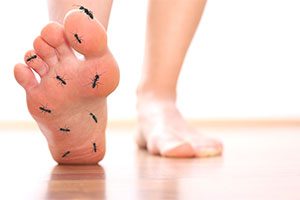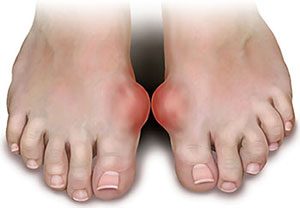Patients are prescribed medications to help treat various ailments from infections to high blood pressure to cancer. Everybody knows medications have a long list of side effects. But did you know that some of these side effects can actually affect your feet? That’s right, medications can cause foot pain and other conditions. So if you start taking a new medication and your feet suddenly begin to hurt, it might not be coincidental.
Neuropathy

People often associate neuropathy with diabetes, but there are countless causes, including medications. The most common medications to cause neuropathy are:
- Chemotherapy drugs such as Cisplatin
- Anti-alcohol drugs like Disulfiram
- Seizure medications like Dilantin
- Antibiotics like fluoroquinolones (including Cipro, Levaquin and Floxin) have been in the news a lot as of late.
- Heart or blood pressure medications including Amiodarone and Hydralazine.
Though these symptoms can certainly be uncomfortable, they are not life-threatening. In fact, if medications are changed or discontinued, they will usually resolve as quickly as several weeks. Although, it may take several months for symptoms to completely resolve.
Gout

- Steak
- Seafood
- Red Wine (my personal favorite)
- Beer
However, as I am sure you will not be surprised (considering the topic of this article), medications can also trigger a gout attack.
These include diuretics or water pills that are commonly prescribed for patients with high blood pressure, congestive heart failure, or increased fluid retention. These medications act by decreasing sodium absorption in the kidneys. In doing so, they increase the body’s absorption of uric acid. Thus resulting in a gout attack.
Examples of diuretics and water pills include:
- Hydrochlorothiazide and Lasix.
- Immunosuppressants such as Cyclosporine
- Vitamins such as Niacin.
Some people think that if they are having a gout attack they just need to take some aspirin since it will help with the inflammation. Wrong! Aspirin is actually known to increase uric acid levels so it is a medication you want to avoid taking during a flare-up. Even low dose aspirin (81 mg) recommended for the prevention of strokes and heart attacks can result in a gouty attack. So make sure you discuss this with your doctor if you are taking even a low dose of aspirin on a regular basis.
Achilles Tendonopathy and Ruptures

Pseudomonas infections are associated with puncture wounds, swimmer’s ear, respiratory infections, urinary tract infections, and severe burns. They can be all treated with a fluoroquinolone antibiotic such as Ciprofloxacin, but there lies a potential problem.
Be very careful because these antibiotics have a direct correlation with Achilles tendinopathy and ruptures. Symptoms can include an immediate onset of pain along the Achilles tendon.
Pain can start as early as a few hours after the initial dose or up to 6 months after you stop taking the drug. The exact cause of fluoroquinolone induced Achilles tendonitis or rupture is still elusive.
It is theorized that the antibiotic causes inflammation to the tendon a few centimeters above its attachment. This area has poor vascularity, which results in inadequate healing. Patients with a suspicion of tendonitis should immediately speak to a doctor about discontinuing antibiotics to reduce their chance of ruptures.
The Bottom Line About Medication and Foot and Ankle Side Effects
Let’s face it, most medications have side effects and they can affect one part of your body or another, including the feet. Whether these side effects are coincidental or not, if you are having any issues with your feet, please visit your podiatrist or see us at University Foot and Ankle Institute. Nobody should have to deal with serious side effects from medications, especially when they could have prevented.
- 15 Summer Foot Care Tips to Put Your Best Feet Forward - July 1, 2024
- If the Shoe Fits, Wear it… Especially for Kids Shoes! - September 4, 2023
- Is Barefoot Running Better? Or are you Running Toward Injury? - August 18, 2023
I am 62. I wore orthotics in my shoes for about 20 years. I quit working because of a back problem 10 years ago. I also stopped wearing orthotics since I was not on my feet as much anymore. Last fall my outer right foot and achilles tendon began to hurt like heck. For more than a year I had been walking 2 miles a day after having heart surgery until this foot pain started. Had the heart surgery 20 months ago today. I went to a foot DR that suggested to wear orthotics again along with a foot splint 2 times for 30 minutes each time every day. That did not help much after 8 months. The splint made my ankle hurt even more. Could my 2 BP meds & water pill make my foot hurt? The foot Dr had a list of all my meds but never mentioned anything about those causing the problem. I did not ask him then.
We are very sorry to read about your situation. We cannot comment at all about what is going on with you medically without seeing you, But if you are not local, please take this up with your doctor. If you ave not confident in their abilities, please find another one. If you let us know where you live, we might be able to refer you to someone.
Please do not give up on this as you deserve to live without this kind of pain.